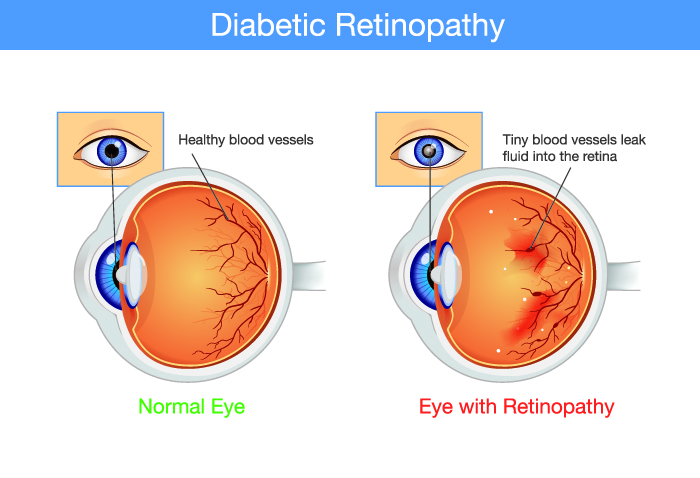Retinal Detachment Treatment & Diagnostics in Chirag Enclave, Delhi
Retinal Detachment
The retina is the cellular screen at the back of your eye that helps in vision. It gets its nutrition from the blood vessels behind it. In the case of retinal detachment, there is a disconnect between the retina and the blood vessels, causing the retinal cells to starve. This is an emergency as it can lead to permanent loss of vision.
If you have been diagnosed with retinal detachment recently, you just need to search for a specialist in ophthalmology near me or an ophthalmology hospital near me or a general surgeon near me or ophthalmology doctors near me.

How many types of retinal detachment are there?
There are three types of retinal detachment:
- Rhegmatogenous
- Tractional
- Exudative
What are the symptoms?
Retinal detachment itself is painless, but warning signs almost always appear before it occurs or progresses, such as:
- Curtain-like shadows in the field of vision
- The appearance of multiple floating spots and these small spots seem to move in your field of vision
- You will notice that you can see less with the corner of your eyes (peripheral vision)
- Photopsia makes you see light flashing in your eyes
What causes retinal detachment?
- A hole or tear in the retina allows fluid to pass through and collect under the retina, separating the retina from the underlying tissue. The cells of the retina die if they lack nutrients, forming patches of the nonfunctional retina.
- Age, causing a change in the consistency of the fluid inside your eyes
- Scar formation in the retinal wall due to diabetes
- Macular degeneration
- Tumor in the eye
- An injury to the eye
- An inflammatory disorder
When do you need to see a doctor?
If you notice any related signs or symptoms, seek medical attention immediately. A retinal detachment is a medical emergency that can cause permanent loss of vision.
Request an appointment at Apollo Spectra Hospitals, Chirag Enclave, New Delhi.
Call 1860 500 2244 to book an appointment.
What are the risk factors?
- You are above 50 years of age
- Positive medical history of retinal detachment
- Someone in your family has suffered from this
- Wear high powered lenses for seeing faraway objects
- Undergone any type of ophthalmology surgery
- Have suffered a severe injury to your eye
- Suffering from retinoschisis
- Suffering from uveitis
- Lattice degeneration or thinning of the peripheral retina
What treatment options are available?
- Surgery is almost always used to repair tears, holes or detachments in the retina. The treatment will vary depending on the extent of the damage done to the retina.
- If the damage is only a retinal tear till now and the detachment has not started yet, your doctor might suggest one of these:
- Photocoagulation: An ophthalmological surgeon uses laser beams to repair the retinal damage through your pupil. The laser burns the cracks in the retina and creates scars, in other words "welding" the retina to the underlying tissue.
- Cryopexy: This is, in simple terms, freezing the retina. After injecting a local anesthetic to numb the eye, the surgeon places the cryoprobe on the outside of the eye, just above the tear fluid. Scar tissue formation due to frostbite helps in reattachment of the retina.
- If the retina is detached, you should have surgery, preferably within a few days after the diagnosis. The type of surgery recommended by your surgeon depends on several factors, including the severity of the detachment.
Request an appointment at Apollo Spectra Hospitals, Chirag Enclave, New Delhi.
Call 1860 500 2244 to book an appointment.
Conclusion
Commencing the treatment as soon as you can is the best option for your eyes at this stage. Your ophthalmologist will suggest a procedure or sometimes, a combination of procedures to let you decide. Make sure that you clear all your doubts before you make a decision. An informed decision is the best way forward.
References
https://www.mayoclinic.org/diseases-conditions/retinal-detachment/symptoms-causes/syc-20351344
Warning signs of retinal detachment may include any or all of the following: sudden onset of flashes and floaters and blurred vision. Consult your eye doctor immediately to maintain vision.
Anything you see from the side of the central focal point when looking straight ahead comes under your peripheral vision. This is your ability to see things without moving your eyes or turning your head.
In this type of detachment, fluid collects under the retina, but there are no holes or ruptures in the retina. Exudative detachment can be caused by age-related problems.
This type of detachment occurs when scar tissue grows on the surface of the retina, causing the retina to detach from the fundus. Traction disengagement is common in people with diabetes or other poorly controlled diseases.
Symptoms
Our Top Specialities
NOTICE BOARD
CONTACT US
CONTACT US
 Book Appointment
Book Appointment


.svg)
.svg)
.svg)
.svg)








